|
|
|
Sort Order |
|
|
|
Items / Page
|
|
|
|
|
|
|
| Srl | Item |
| 1 |
ID:
093991
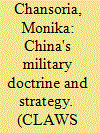

|
|
|
| 2 |
ID:
131980
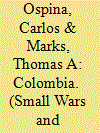

|
|
|
|
|
| Publication |
2014.
|
| Summary/Abstract |
From 1965 to the present, Colombia has been confronted by the insurgency of the Revolutionary Armed Forces of Colombia (FARC). The threat reached a new level in 1996 with the advent of mobile warfare, whereby large units sought to neutralize the military in an effort to seize power and institute a Marxist-Leninist regime. Unlike Vietnam, what followed was a regaining of the strategic initiative by the government and a decimation of the insurgent threat. This was accomplished with US assistance but from first to last was driven by Colombian leadership and strategy. The strategy which led to this signal change, 'Democratic Security', unfolded under the leadership of President Álvaro Uribe. It was a civil-military partnership, which sought to expand the writ of Colombian democracy to all elements of society. Securing the population provided the shield behind which economic, social, and political life could occur as driven by the will of the people. It was the agreement upon legitimacy as the strategic goal and reform as the route to that goal which allowed the Colombians and the Americans to work so well together.
|
|
|
|
|
|
|
|
|
|
|
|
|
|
|
|
| 3 |
ID:
133516
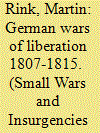

|
|
|
|
|
| Publication |
2014.
|
| Summary/Abstract |
In the Age of Napoleon, 'small wars' and 'revolutionary war' were closely connected. There were, however, different strands of this phenomenon: speaking professionally, conservative officers condemned small wars as an irregular regression to previous less disciplined forms of warfare. The Prussian state continually tried to discipline and regulate spontaneous risings. Yet the irregular character of small wars offered the opportunities for a less complex way of fighting, thus enabling the arming of the 'people' to fight. Individual undertakings, such as Ferdinand von Schill's doomed campaign in 1809, were designed to spark off a general popular uprising. But they were cheered by many and supported by few. Meanwhile, Neidhardt von Gneisenau conceived guerrilla-style Landsturm home-defence forces, which were designed for an irregular people's war. These concepts were put into practice in the 'war of freedom' - or 'war of liberation' - in 1813. Eventually both the mobilisation and the tactics remained regular, however, despite the emphatic appeal to a national 'people's war'.
|
|
|
|
|
|
|
|
|
|
|
|
|
|
|
|
| 4 |
ID:
100012
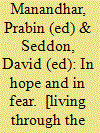

|
|
|
|
|
| Publication |
New Delhi, Adroit Publishers, 2010.
|
| Description |
xiv, 256p.
|
| Standard Number |
9788187392927, hbk
|
|
|
|
|
|
|
|
|
|
|
|
Copies: C:1/I:0,R:0,Q:0
Circulation
| Accession# | Call# | Current Location | Status | Policy | Location |
| 055476 | 355.0218095496/MAN 055476 | Main | On Shelf | General | |
|
|
|
|
| 5 |
ID:
133518
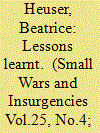

|
|
|
|
|
| Publication |
2014.
|
| Summary/Abstract |
Did participants in small wars in the period 1775-1831 learn from previous or contemporary examples? While this is difficult to prove for participants who left no written records, there is considerable evidence in existing publications by practitioners that they did indeed draw out lessons from recent insurgencies, either from their own experience or from events elsewhere which they studied from afar, especially the Spanish Guerrilla, which had already become legendary. Most authors showed an interest in how to stage insurgencies rather than in how to quell them. Even then, transfer did not come in a package of tactics-cum-values, but in each case in different configurations.
|
|
|
|
|
|
|
|
|
|
|
|
|
|
|
|
|
|
|
|
|